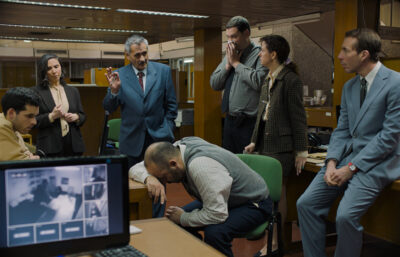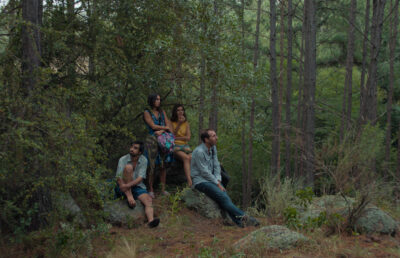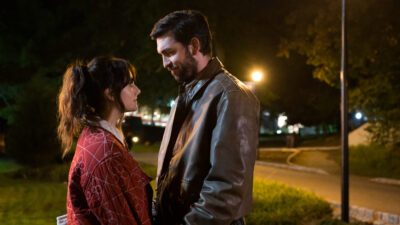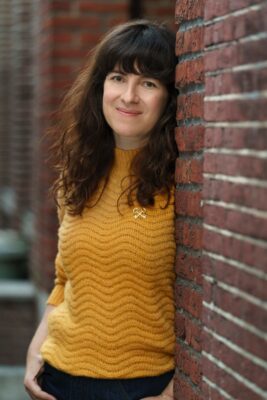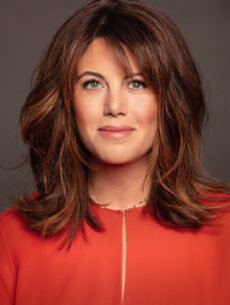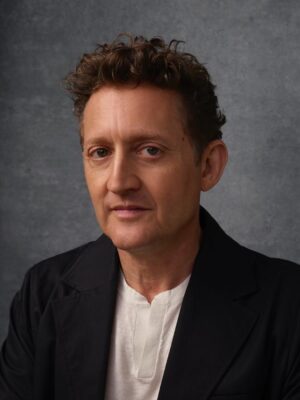“Come, come! I’m sick to death of this particular self. I want another.” Taking Virginia Woolf’s novel Orlando: A Biography as its starting point, academic virtuoso-turned-filmmaker Paul B. Preciado has fashioned the documentary Orlando: My Political Biography as a personal essay, historical analysis, and social manifesto which premiered and took home four prizes at the 2023 Berlin Film Festival. For almost a century, Woolf’s eponymous hero/heroine has inspired readers for their gender fluidity across physical and spiritual metamorphoses over a 300-year lifetime. Preciado casts a diverse cross-section of more than twenty trans and non-binary individuals in the role of Orlando as they perform interpretations of scenes from the novel, weaving into Woolf’s narrative their own stories of identity and transition. Not content to simply update a seminal work, Preciado interrogates the relevance of Orlando in the continuing struggle against anti-trans ideologies and in the fight for global trans rights.
We open Orlando: My Political Biography November 17 at the Royal, Town Center and Claremont and November 24 in Glendale.
Preciado was recently interviewed by Michael Joshua Rowin:
When did you first read Virginia Woolf’s Orlando, and when did you first consider making it the subject and point of departure for your film?
Well, I read the book when I was fifteen, studying English literature at school. The book was not presented as a transgender book or anything like that — it was just presented to us as a book full of adventures.
I was born in 1970s Spain, when it was still a fascist country. I was brought up as a straight Catholic in a fascist context, and reading Virginia Woolf as a teenager was amazing, because suddenly a whole new horizon opened up to me. Before I had heard of anybody having had a sex change–which is what we called it at the time–that idea became possible for me, the reality of becoming someone else became possible for me because of that book. Which I find fascinating, because in a sense fiction became politically more powerful than reality itself.
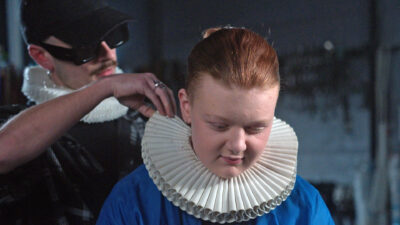
So that book has always been with me, but I never thought about the possibility of acting out or adapting the book. I was trained as a critical theorist in philosophy, which is what I’ve been doing all my life. So I never thought of filmmaking as something I could fully develop as a talent or even explore, let alone for adapting Virginia Woolf. I always felt I had a more political or philosophical dialogue with that book that then would make sense as cinema. But at some point I realized that many of the different projects that I had been doing all my life–looking at documents and images, thinking about them as political records or testimonials or histories–could also be interesting as cinema: to not just create a criticism or interpretation of images, but to participate in decoding or creating new images. In working on the documentary, I realized that it was such a collective project–that it wasn’t an individual endeavor but actually a bit like cultural activism, just that instead of gathering together with the aim of criticizing the law or putting out a statement it was in the name of a poetic, creative act. I was seduced by that, and little by little I began to believe that making the documentary was possible.
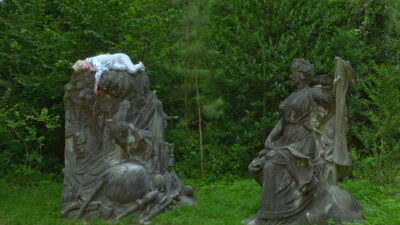
Speaking of collaboration, how did you discover and cast the people who play the various Orlandos throughout your film? Did choosing them in any way determine the film’s content and structure?
When Arte, the French TV production company, first proposed to me the idea of making the film, they had in mind a film in which I would play or be the main character. They had in mind a very classical documentary that I would lead or narrate as a critical thinker, something in which I would discuss my life as accompanied by images. When they approached me with this idea I said to them, “Well, if you really want to make a documentary the best thing would be an adaptation of Virginia Woolf.” And honestly, this was a joke when I first said it–it was a way of saying “I don’t really want to do this film as you’re proposing it,” because I didn’t believe in this way of narrating my autobiography. The way we traditionally narrate biographies or autobiographies is very binary, very normative. And I knew that I did not believe in this way of narrating my autobiography, because I know that I wasn’t exactly born in the year I was born. The stories of all of us begin long before the time when we are born. For me, I chose to belong to other genealogies than the one that was assigned to me at birth. So when I proposed to Arte that I adapt Woolf I never expected that they’d say, “This is such a good idea”!
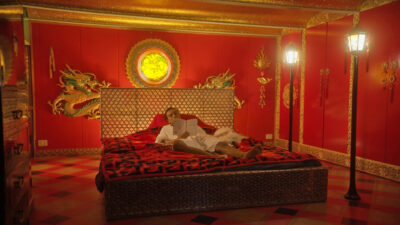
In speaking with my producers I decided to try, in a way, to rewrite Orlando as my autobiography, which is already an anti-binary way of twisting the documentary format, and they felt, “You’re totally crazy–how is this going to work?” And when I told them that I wanted other people to play my role as well as that of Orlando, they thought I wouldn’t be able to find other transgendered people who would be happy to do that. But when we initiated casting through the Internet, only a few weeks later we had over a hundred people that sent us all kinds of materials. We started to watch their tapes and media recordings. Mostly I asked people to select a passage from Woolf and explain why they wanted to play the role. Most of the people were very young, from eighteen to twenty-five. I also put out a sort of casting call to people I knew in the trans community who were meaningful to me for different reasons: Jenny Bel’air, for instance. She’s a trans woman in her seventies who’s politically meaningful to so many of us in my generation.
The way I selected the other participants was by trying to understand if they could speak the language of Virginia Woolf. This, to me, was the most difficult aspect of any Orlando performance, because Virginia Woolf’s language is so sophisticated, so crystalized and sparkling, that it’s hard to speak her words without sounding phony or ridiculous. At the beginning I chose four or five people and read the book together, trying to understand what we would do if we were to use the book to speak about our own lives. This is when it began to be clear to me that this aspect of the film would be possible–that people would be able to reappropriate Woolf’s language. Also, on a more philosophical or political level, I watched a lot of other films that had to do with trans issues. And I realized that in documentaries–even more so than in fiction films–the subjects are caged within medical, psychological, and legal lexicons. The more you try to explain what you’re living through, what it means to transition, what it means to live in a society that is mostly binary–for me, that experience is fascinating, it’s a metaphysical experience that is beautiful to live, but often in communicating it you have to use normative language. So in the end very little is left from that outstanding experience that is not contained in such language.
When gathering in groups to read from Orlando, especially with the teenagers and their families, little by little their issues that were framed within the normative language–their issues in receiving the right medication or in legally renaming themselves, and so on–these issues faded and something else started to happen. We discovered a freedom in reappropriating the words of Virginia Woolf. And not because Virginia Woolf said everything possible about transitioning, but because I think Virginia Woolf may have also been non-binary. In the last forty to fifty years she’s been read–perhaps even over-read–as an exemplar of female and feminist authorship. But when re-reading her I realized she was very much at odds with what was supposed to be her own femininity. She was not comfortable with it and never aligned with it so much–she wasn’t even very interested in a naturalistic definition of feminism, at least as it existed during her lifetime. So I’ve thought, how interesting would it be if she was a non-binary author who lived during a time when the thought of being non-binary was impossible? That opened for me a very different way of reading Orlando. I’m not content with the politics of reading works through the identity of the author–for example, the idea that if the author isn’t trans then his or her book can’t be trans. Because maybe the author was able to recreate him, herself or themselves, in his, her or their own mind. The things we do exceed identity–otherwise if we have to be measured by our anatomy or whatever else then we’re going to be caged within the language of normative binaries. So that’s crucial for me. And when working on the readings of Orlando something started to happen–we brought Woolf into a contemporary, non-binary world, and a sort of joyful, amusing adventure began to occur in how we experienced her words, to the point where the cast members and their families would call me and say, “These readings are great, can we come back for more of them?” Then it became clear to me that this was working, that we could use the language of Virginia Woolf against the language of normative identity.
At one point the producers suggested that I film these reading sessions, but I didn’t want to do that because what was happening there was so fragile–sometimes people were crying or reacting in other emotional ways, and I didn’t want my film to be a sort of “victim pornography.” I told my producers, no, the cast members are building their own inner Orlandos that they’ll soon be able to present to the world. When I felt that they were ready I said that we should try something crazy, like dressing them as if they’re from different ages of history–then let’s see what happens. It took a really long time to get to the idea of how I was going to adapt Woolf, but once I tried shooting the cast members in costume and speaking in the words of Orlando, I realized it would work.
And what was beautiful to me–someone coming from writing and philosophy, someone with a very analytical, controlling mind that wants to understand how everything works–was seeing what each Orlando was bringing to the film. Each one found their own way of mixing Woolf’s words with their own feelings and their own stories. I think people who know me expected the film to be much more of a direct political statement or something like that, but I said no, this is impossible–it’s a collective work, and each Orlando has different degrees of radicality and vulnerability. And I loved that, allowing each person in the film to be their own Orlando.
Orlando: My Political Autobiography contains several references to the work of Jean-Luc Godard, who died during production. How did Godard and his films influence your project?
When I became conscious that I was making a film I was obsessively reviewing films that had influenced or inspired me. And I discovered two main inspirations that were very remote from one another. One was the essay-style of filmmaking, like Chris Marker or Godard, which is often not queer at all. On the contrary, even when such filmmakers approach political or postcolonial issues they often possess a very male, Eurocentric point of view. But formally, their fabrication of a language and their understanding that cinema is a subjective technology–that film is very similar to the unfolding of consciousness–that was very influential to me. So I have to say that I’m a Godard fan but a little bit ashamed of it–because of my queer, feminist credentials I always thought, “This guy is driving me nuts,” but I’ve also thought, “Look how he says what he manages to say.”
On the other hand, I’ve been very much influenced by underground queer filmmaking like Flaming Creatures or Hans Scheirl’s films or the films of Kenneth Anger—also films from the 70s and 80s that I consumed when I was growing up. So the question was how to combine these two strands. And with someone like Godard I thought, what if he had been feminist or trans?
And it’s true–we were shooting one of the scenes in the film, and one of the crew who had worked with Godard received a message that he had just died. So we decided to place that news in the film because he was important for all of us–many of us had either known Godard directly or had been influenced by his work.
How did you select scenes from Woolf’s novel to recreate on screen?
That’s an interesting question, because when I was reading and working on the novel at the beginning of production I had many more scenes in mind than what ended up being included in the film. Some of the scenes were chosen by the Orlandos through the reading sessions that I mentioned earlier–some Orlandos lobbied for certain scenes in the novel to be included in the film, and we went with those. The scene of Orlando returning to England by ship after having transformed into a woman, I really wanted to adapt this scene properly since it’s one of the crucial scenes in the novel. But it became so difficult. We went to the north of France and obtained a small boat that we had to pretend was bigger than it was–it was extremely expensive, and I had very little money with which to make the film. Very quickly we realized that this scene was impossible, that it wasn’t going to work. So we decided to make a mock-up of a boat in a studio and see how that would look. Many of the scenes I had in mind–especially since Orlando is a book of adventures and travel and changing epochs and countries–couldn’t be rendered on film as they are in the novel. Another example was a scene in the desert that became difficult to pull off since I had to find a desert that was nearby–and there are no deserts close to France! At a certain point I realized that faithfully adapting such scenes was less important than capturing the language of Virginia Woolf as well as representing the main adventure of the book, which is transitioning. It would be less about constructing the proper settings and decor and more of a spiritual or internal journey.
One other thing–and I haven’t mentioned this too much in other interviews–is that I also thought of including Virginia Woolf herself as a character in the film. I thought of a trans actor and dancer who I very much admire to play this character, and I thought of them as performing as Virginia Woolf in the act of writing Orlando. We weren’t able to shoot it in the end, but that’s okay, because the experience of making the film became a kind of philosophical exercise, an experience of workshopping, of figuring out what it takes and what it even means to make a film. Even the failures–there were so many times when we would go out to shoot scenes with the various Orlandos and nothing would work, it was a complete catastrophe. After which I would sit out home and think, “Okay, this is an equation: how do I solve it?” Which is an ordinary experience for people who make films. And what I value in that is the opportunity to experiment. Because so many times my producers would tell me, “The way you want to do things, that’s just not how people make films,” or “In the cinema you don’t do things this way”–even having twenty-five actors play Orlando. And I would say, “Okay, but that’s the way I want to make it.”
In addition to considering the way Woolf’s novel can provide a better understanding of current politics, your film considers the way current politics surrounding sexual identity can provide a better understanding of the novel. From which direction did you first proceed, or were you thinking of both tracks simultaneously?
I guess when I was earlier speaking of Virginia Woolf as a non-binary author, that was an answer to this question as well. My contention is that we’re in a moment of epistemic shift, from one that is carbon-based, patriarchal, colonial, capitalist, etc. to something very different and that will bring different understandings of sexuality, the body, subjectivity, and so on. And that’s why transitioning is so crucial–because it may be a model for becoming something else, something better than what we thought we were before. And it’s interesting to look at this possibility through Woolf’s Orlando, because the novel takes place over a span of over 300 years and is trying to look at human existence from some vantage point beyond that of our petty, individual lives. It’s looking at our lives from the vantage point of societies in transition over many epochs. I see this as something so beautiful–even the historical mistakes and political horrors, because we can think about how we can carry on with the memory of these events, even the memory of the violence that we have individually inflicted and endured. And I think it’s also important to look back at this book not from the point of view of the binary–the comic dimension of “Oh, what was once a man is now a woman.” Because maybe we missed something, we missed the beauty of a becoming which is really not knowing, the uncertainty of something that couldn’t be contained within our limited categories. It speaks to non-binaries in every respect: the lack of barriers between writing and filmmaking, or politics and poetry, male and female, heterosexual and homosexual, trans and non-trans. What if we were able to transition to an epistemic regime which is fully non-binary?
Would you say that the style of your film mirrors its content — that since its aim is to challenge conventional narratives of gender politics, it only makes sense that it should also challenge conventional forms of fiction, documentary, and other kinds of cinema?
If this is the case it would be a major achievement…but this is a monumental task, a sort of cultural endeavor which will take decades. But, in any case, this was my utopian aim. I didn’t want to make a film about “being trans” but rather a trans and non-binary film.
The challenge of making a trans film is to undo the normative differences not only between a feature film and a documentary film, fiction and a biography, politics and poetry, theory and practice, but also between the traditional ways of representing femininity and masculinity, between what being and not-being-trans means in a binary society. A non-binary films works according to what we could call with Gilles Deleuze, “a logic of multiplicities”, “a theory and practice of relations, of “the AND”, which at every levels tries to question the classifications based on the strict binary delineation of “either-or”. To give you an example, I didn’t want to choose between narrating my biography and telling a larger trans political history, or between Virginia Woolf’s language and the way of speaking of contemporary Orlandos, or between an adaptation of a novel and a documentary with “real” people. As a result the film is neither one nor the other, but a becoming-other.
Paul B. Preciado is a writer, philosopher, curator, and one of the leading thinkers in the study of gender and body politics. Among his different assignments, he has been Curator of Public Programs of documenta 14 (Kassel/Athens), Curator of the Taiwan Pavilion in Venice in 2019, and Head of Research of the Museum of Contemporary Art of Barcelona (MACBA). His books, Counter-sexual Manifesto (Columbia University Press); Testo Junkie (The Feminist Press); Pornotopia (Zone Books); An Apartment in Uranus (Semiotexte and Fitzcarraldo), and Can the Monster Speak (Semiotexte and Fitzcarraldo), and Dysphoria Mundi (Grasset, Graywolf and Fitzcarraldo) are a key reference to queer, trans and non-binary contemporary art and activism. He was born in Spain and lives in Paris.

